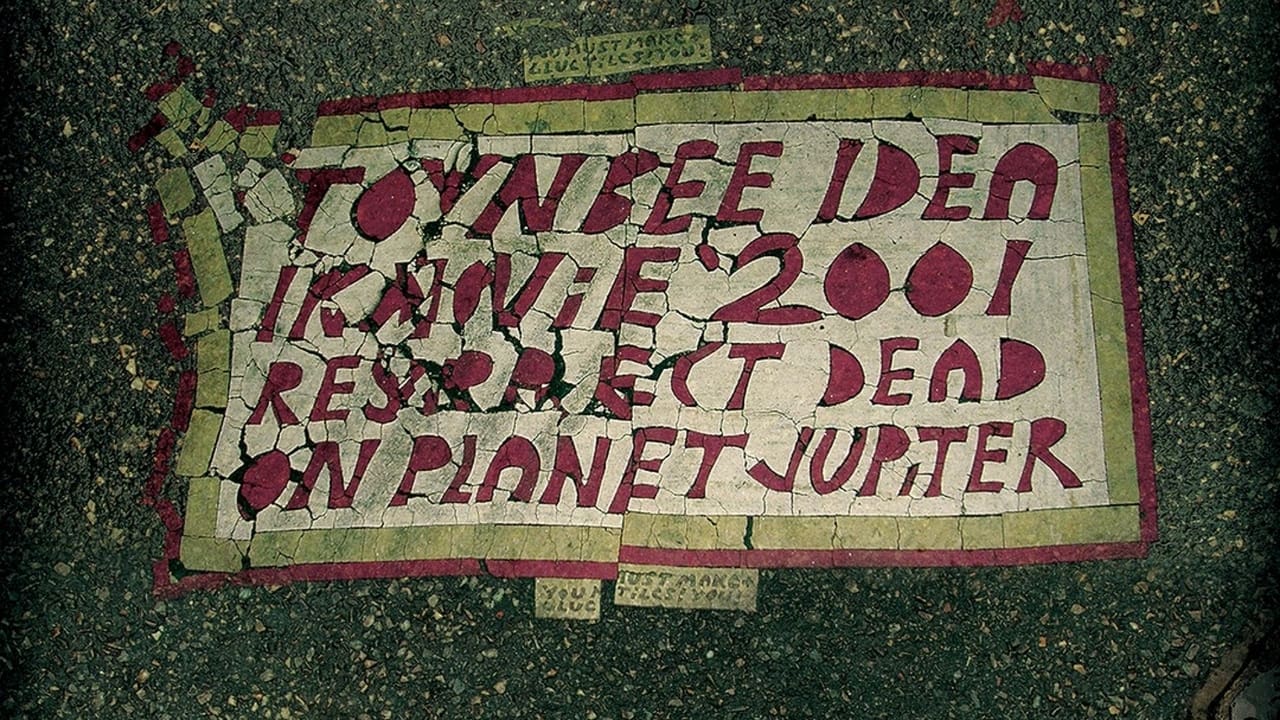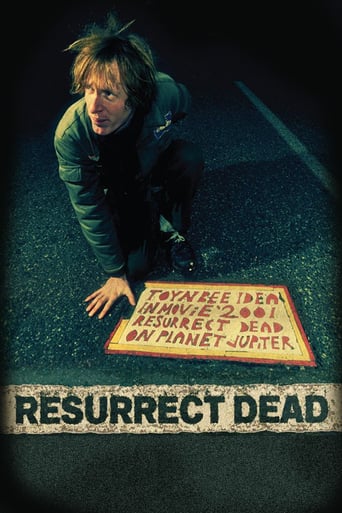



Good story, Not enough for a whole film
n my opinion it was a great movie with some interesting elements, even though having some plot holes and the ending probably was just too messy and crammed together, but still fun to watch and not your casual movie that is similar to all other ones.
View Morea film so unique, intoxicating and bizarre that it not only demands another viewing, but is also forgivable as a satirical comedy where the jokes eventually take the back seat.
View MoreStrong acting helps the film overcome an uncertain premise and create characters that hold our attention absolutely.
View MoreThe rise of the internet in the 1990s suddenly gave people the ability to talk and form communities about all kinds of weird niche hobbies and mysteries that, as isolated individuals, they previously had to muse over in silence. One of these, I remember, was the "Toynbee Tiles", linoleum squares left on the streets of Philadelphia over these years that contained the cryptic message "Toynbee idea in Kubrick's 2001 Resurrect dead on planet Jupiter". (It's an odd American analogue to the mysterious man in Australia who used to go around scrawling "Eternity" everywhere.) The Toynbee tile maker was obviously a nutter, but in spite of much speculation among enthusiasts who would upload photos of tile sightings and try to riddle out the message, his or her identity remained a mystery... until this 2011 documentary film.RESURRECT DEAD tracks the work of an investigative team of nerds as they put together the pieces of Toynbee sightings from the late 1970s to the present, ultimately identifying the tile maker with an overwhelming degree of accuracy. These are Justin Duerr, the main face of the film, along with Colin Smith and Steve Weinik. Justin Duerr strikes this viewer as rather autistic, and his consuming interest in collecting Toynbee tile information and social awkwardness fills every frame. (I might not be the only one who thinks that his jerky mannerisms and obsession resemble cinema auteur Wes Anderson.) But Duerr is also an artist, and he's so curious about the Toynbee tile maker because he recognizes in the man, mentally ill though the tiler might be, a fellow artist and creative individual.The Toynbee tiler wasn't just leaving tiles. For a time in the 1980s, he would drive around Philadelphia broadcasting his theories over pirate radio. In the middle portion of RESURRECT DEAD, the trio of investigators make contact with radio enthusiasts who prove to have had some limited contact with the tiler back in the day. As the film ends, they have traced the tile maker to a Philadelphia address that belongs to a paranoid recluse. He refuses to answer the door, but his neighbours provide key information, like the fact that his car has a hole in the floorboard, presumably to drop the tiles surreptitiously. The decision to name this recluse might upset some viewers, but besides that single knock on the door and a mailed letter, the filmmakers don't try to intrude on his life, and they decide to just let him be, basking in the satisfaction that they've solved the mystery.I was intrigued by the tiles when I first came across the Toynbee tile community on the early web, around 1995 or so, and though I was never an obsessive like these filmmakers, the idea of the Toynbee tiles remained in the back of my mind as a quirky mystery over the years. While I was happy to discover that everything is now clear, I was disappointed by this documentary film. Its 90-minute length has a lot of filler, like dumb slow-motion replays of the group looking stunned as they learn key facts. Justin Duerr's narration to the camera is chock-a-block with "like", "uh...", "so...", "you know..." -- could he have not thought more clearly what he was going to say for his own film? Ultimately, I commend these investigators for their achievement, but anyone curious about the Toynbee tiles should just read the bare facts as laid out in 5 minutes' reading of press coverage of the investigation, or on everyone's favourite online encyclopedia. Sitting through an hour and a half of this doc just feels like wasted time.
View MoreThis fascinating documentary, directed by Jon Foy, examines the mystery of what is called the Toynbee tiles. Since the 1980's 130 plaques , or tiles, have appeared on various city streets which all have the same cryptic message--"Toynbee Idea In Movie 2001 Resurrect Dead on Planet Jupiter.Although many have been spotted in the Philadelphia area, others were located in the Midwest, New York City, even a few in South America. Some were even spotted on the highway and one just outside the Lincoln Tunnel in New York.Who's leaving these mysterious tiles and what do they mean? Three young men, Justin Duerr, Colin Smith, and Steve Weinik were all separately investigating this mystery when they decided to join forces after a number of years and see if they could come up with the answer.To me the fun and interest was in the "peeling of the onion", so to speak, as they took several key clues and tried to thoroughly examine them. One clue would lead to another and open up possibilities while some would lead to dead ends.Finally, through hard nosed detective work they began to unravel the mystery. I find this type of out of the mainstream documentary riveting and rewarding.If you've ever seen and enjoyed "The History Detectives" on PBS you may very like this film as well.
View MoreThe "Toynbee Tiles" are a series of 130 known plaques, predominantly found in North American cities and first sighted in the early 1980s, that propagate the following message (see picture attached):TOYNBEE IDEA IN MOVIE 2001 RESURRECT DEAD ON PLANET JUPITERThe ambiguity of the message and the absence of ownership has long-fuelled an active online community contributing sightings and information that they hope one day will lead to enlightenment. Justin Duerr, the protagonist of Foy's film, is one such fan. First discovering a Toynbee Tile on his mail route, he has spent much of his adult life documenting new sightings and following leads to unravel the mystery.The online consensus, revealed and substantiated by Duerr, is that the message refers to a society named the 'Minority Association', operating in the early 80s, who advocated historian Arnold Toynbee's belief that 'dead molecules' could be rearranged to bring the dead back to life. Kubrick's '2001: A Space Odyssey' is referenced in part due to the use of this mechanism to bring its astronauts back to consciousness in space. The content of the actual message is soon shown however to pale in significance to the intrigue surrounding its creator. Added text found around certain individual tiles points to a troubled, paranoid mind, obsessed with conspiracies (the USSR, NBC, the Mafia to name but three) and fearful for his own life.Duerr's background is almost as intriguing as that of the artist he is attempting to track down. Growing up in a converted barn, he had two passions; art and pigeons. His art teacher at school, who doted over his every stroke but wished for him to conform, served only to push him to drop out aged 16. Finding himself squatting in the city, Justin needed an occupation; a job as a courier was merely a means to an end, the pursuit of the Toynbee Tiles mystery quickly becomes his real life's work. With the help of the artist's own archival footage and Foy's cartoon recreations, Duerr traces the arc of his prior investigation to establish what is known about the person responsible for the cryptic tiles. Enlisting the support of two other Toynbee Tile aficionados, long-haired, forum moderator Colin Smith and photographer Steve Weinik, their research narrows the field of 'suspects' down until they are left with just one - the introverted, paranoid owner of a boarded-up home in suburban Philadelphia - nicknamed 'the Birdman' by local kids for his menagerie - and known only to leave in the early hours. With the architect of this decade- long mystery unwilling to come to the door, Foy and Duerr are clearly left with a difficult decision; do they harass the man and hope for a confession, or grant him his wish and leave him alone - with the mystery half-solved but lacking crucial confirmation? As it happens, much of the film's criticism (it rates only 60-odd percent on RT) is found in the supposed-inconclusiveness of Foy's chosen ending. However, I think it would be a mistake to view the pursuit of the Toynbee Tile creator as for the purpose and resolution of the audience's intrigue; it is much more personal to Duerr. If the man who has spent over a decade unravelling the mystery is content that he has his answer and ready to move on, who are we to demand he digs further?Perhaps some mysteries are best left as just that?
View More"TOYNBEE IDEA IN Kubrick's 2001 RESURRECT DEAD ON PLANET JUPITER."Stanley Kubrick's 2001 provides the catalyst for a decades-long planting of tiles in streets all over the US and South America with the above message. The documentary Resurrect Dead: The Mystery of the Toynbee Tiles is director, writer John Foy's attempt to chronicle Justin Duerr's search for the author of these tiles and their meaning.The film is not as compelling as it might be as Wikipedia already lists the perpetrator, whom Duerr identifies after a process of elimination to be Philadelphian Severino "Sevy" Verna, aka James Morasco. He purportedly placed the tiles through a hole in the floor of his car while broadcasting a message via short wave radio about his theories.Thus the suspense is a surface affectation with the film really being about the process of identifying the artist of the tiles. Actually, the deconstruction of the tiles' meaning is more interesting than the hunt for the author, the meaning resting squarely on Toynbee's theory that the body's molecules after death could be reassembled on Jupiter as Kubrick had hinted in his denouement imagery.In addition to 2001, a 1983 short play by David Mamet, 4 A.M., depicts a Larry King-like radio host taking a call about 2001, Toynbee, and plans to populate Jupiter with those reconstituted molecules. Mamet has been flattered thinking the tiles were inspired by the play.Too many talking-head sequences mask the lack of evidence beyond the tiles themselves. Visits to the alleged perpetrator's hood are cold leads that only hint at disclosure and certainly add little to the hunt. Artfully moody original music by Foy lends atmosphere to what ends up an amusing account of two nerds searching out another nerd. I have enough of that experience visiting Com-Con and Star Trek conventions.
View More